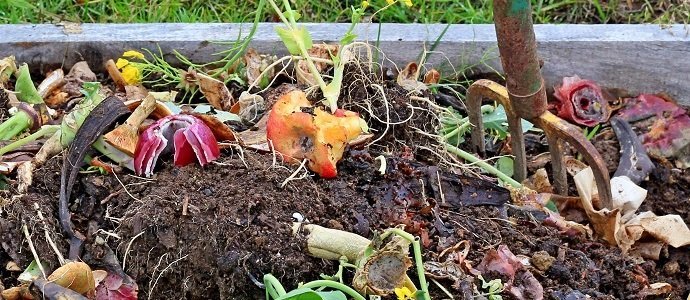If you are a backyard gardening, flower gardener, market gardener, permaculturalist or a farm and you are not composting - ask yourself why not? If you are concerned about the nutrient value of your soil - are you composting?

What is Compost?
Compost is decomposed organic materials, such as leaves, grass clippings, and kitchen waste that can be added to the soil as a natural means of putting nutrients back into the soil. Compost provides essential nutrients for plant growth as well as improving the structure of the soil so that it can hold the correct amount of moisture, nutrients and air.
Food scraps and yard waste make up more than 30 percent of what the average family throws away, which could be composted instead making it an extremely valuable fertilizer for food production utilized by farmers and gardeners.
Compost requires four basic ingredients:
Browns - Materials that help add bulk and allow air to better get into the compost. Brown materials are a source of carbon in your compost pile. Materials include leaves, branches, twigs, wood chips, pine shavings, shredded newspaper, tea bags and coffee filters.
Greens - Materials that are rich in nitrogen or protein. They are also the items that tend to heat a compost pile up because they help the microorganisms in the pile grow and multiply quickly. Green material includes grass clippings plus fruit, vegetable waste, food leftovers and coffee grounds.
Water - All life needs water, including the microorganisms and insects that help your compost pile decompose. The right amount of water helps these organisms thrive and turn your compost into usable form quickly. Water also helps regulate a pile's temperature.
Air - Aerobic organisms need to breathe air to survive. Aeration is necessary in high temperature aerobic composting for rapid odor-free decomposition. Aeration is also useful in reducing high initial moisture content in composting materials. Volume will reduce during the compost process.
How to Maintain Compost?
Your compost pile should have an equal amount of browns to greens. You should also alternate layers of organic materials of different-sized particles. The brown materials provide carbon for your compost, the green materials provide nitrogen, and the water provides moisture to help break down the organic matter.
Whether you have a small backyard compost bin or a large scale pile, your compost will need to be turned on a regular basis. Turning allows for air and moisture to get to all areas of the compost aiding in decomposition.
If your compost pile is not heating up or decreasing in size, it is a sign that it needs air and moisture, so you need to turn your pile more often to bring it back to life. A very alive compost pile will have lots of worms and bugs aiding in the digestion of the food. A well maintained compost will have a pleasant smell.
What To Compost? – ALMOST EVERYTHING
- Fruits and vegetables
- Eggshells
- Food items such as pasta, rice, bread, etc.
- Coffee grounds and filters
- Tea bags – fibre not plastic
- Nut shells
- Paper products (non coated)
- Yard trimmings
- Grass clippings
- Houseplants
- Hay and straw
- Leaves
- Sawdust
- Twigs and branches
- Wood chips / wood shavings
- Hair and fur
- Dryer lint
- Fireplace ashes
- Shredded newspaper (vegetable ink)
- Shredded cardboard (non coated)
- Shredded
What Not To Compost and Why?
Black walnut tree leaves or twigs
- Releases substances that might be harmful to plants
Coal or charcoal ash
- Might contain substances harmful to plants
Yard trimmings treated with chemical pesticides
- Might kill beneficial composting organisms
* Dairy products (e.g., butter, milk, sour cream, yogurt) and eggs
- Create odor problems and attract pests such as rodents and flies
* Diseased or insect-ridden plants
- Diseases or insects might survive and be transferred back to other plants
* Weeds
- it is the seeds from weeds that are unwanted as the seeds will survive levels of heat and when used back onto the soil, will propagate more weeds.
* Fats, grease, lard, or oils
- Create odor problems and attract pests such as rodents and predators
* Meat or fish bones and scraps*
- Create odor problems and attract pests such as rodents and predators
* Pet wastes (e.g., dog or cat feces, soiled cat litter)*
- Might contain parasites, bacteria, germs, pathogens, and viruses harmful to humans
* Special Note: Small scale, household and backyard composts piles will not be large enough or get hot enough to digest these materials and the pathogens that they often bring. However, large scale farming operations that are adding animal manure to their piles will be able to compost these materials as the heaps will become sufficiently large enough and hot enough to digest all materials, killing off all pathogens.
What are the Benefits of Composting?
- Enriches soil, helping retain moisture and suppress plant diseases and pests.
- Reduces the need for chemical fertilizers.
- Encourages the production of beneficial bacteria and fungi that break down organic matter to create humus, a rich nutrient-based material that enhance the vitality of the soil.
|